I always insisted I was a trumpet.
When I was in the 7th grade they let us choose our instruments for band. It was optional, and all the other kids would learn another subject while we played our new instruments.
To my parents, it wasn’t a question of whether I’d join band, just what instrument I’d play when I joined. But my parents’ funds were, to put it gently, limited. So when I came back asking for a trumpet, the cheapest of which ran $600 used, they told me to get a flute instead. Being 12 I had no choice but to comply.
A week later, my dad returned with a flute he’d bought off the buy and sell. My ‘new’ flute came with a thick black coating of tarnish and grease, worn out pads (a problem I wouldn’t become aware of for years), no cleaning equipment and an embarrassingly retro case. For months I was ashamed to put it together in the same room as my classmates, with their shiny new instruments and shiny new cleaning supplies. We did not get off on a good foot, my flute and I.
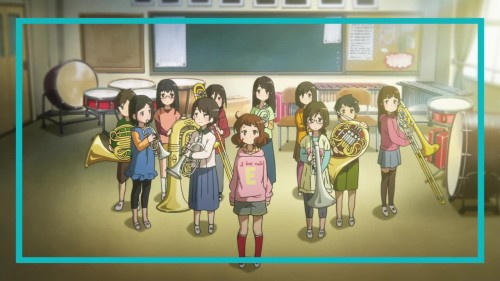
So I can relate a little, with Kumiko’s stance on her euphonium. It wasn’t really her choice. The euphonium’s a difficult sell to a young student, too. Unlike the tuba, which is the bass brass instrument to play, the trombone with its fun-looking slide, the euphonium is a bit of an odd one out. Not quite high enough in pitch to occasionally carry the melody like the french horn or trombones, yet unable to become the cornerstone of the bass section like the tuba. In my band experience, euphoniums seemed to be relegated to the trumpet players who weren’t quite good enough to master the higher register. It was an instrument for rejects.
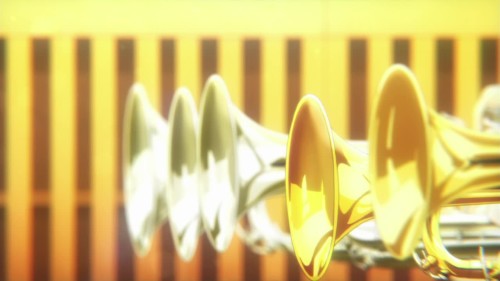
There’s a game that band kids play when they first meet each other: they try to guess what instrument the other plays, based on personality alone. Percussionists are chill, because they bang things around all day. Bass players are slow and steady. Clarinets have an inner warmth with a difficult exterior. Tubas and Trombones are the types that have big, meaty laughs. Trumpets are proud and noble and brave; a bit loud. Flutes are delicate, picky, a bit of a showoff. Euphonium, in my mind, was always synonymous with kind of a screwup. Not only did they not get the cool parts, they often didn’t play their easy parts well.
There were always too many flutes in every year of our band. Band teachers made no efforts to balance the instrumentation when kids were picking their instruments in the 7th grade. So every program from every elementary school that fed into our high school band had a glut of flutes, clarinets, saxophones and trumpets, and nearly no bass section. If we were lucky, we had a set of three trombonists, a bass, a bass clarinet and a euphonium to balance out 30 clarinets and flutes. The order of the day was to always, always, always play quieter.
Despite this, I found the time to polish the tarnish away on my flute completely. I convinced my dad to spend the money (nearly as much as the flute was itself!) to replace the leaky pads. In my own indirect way I had a great love for my flute. But I couldn’t tame the notoriously sharp higher register, or to get low C below the bar lines to sound consistently. My tone was wispy and unfocused, and I could not place my notes without squeaking. I thought that was just how it was – you either sounded good, or you didn’t, and I didn’t sound good because, damnit, I was meant to be a trumpet! When people played the guess-the-instrument game with me, they’d always guess trumpet, and I’d always tell them that, if not for my parents, they were right.
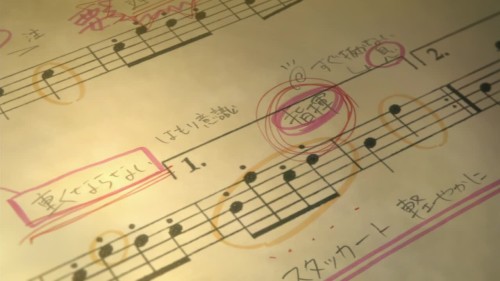
I was pretty hyped up for Sound! Euphonium as soon as the concept was announced. I’ll generally watch any anime about musicians out there and enjoy it, simply because being in band was such a big part of my high school experience. It wasn’t just band class, they were your band family, with you from the 8th grade to the 12th. Together, we made something that no other person could replicate, and no one of us could do alone.
I don’t think Euphonium was perfect by any stretch. There are music anime that loved the music more than it – Nodame Cantabile for example. There are Kyoto Animation-produced anime that are better rendered, such as Hyouka. But what it did unmistakably right was the little moments. Scribbling the conductor’s notes onto the score. Little views between the stands. The emotional discord created when a soloist is chosen. Moreso than any of those moments, though, it was the final performance that sold me.
The focused, nervous congregation, clustering in sections in the holding room.
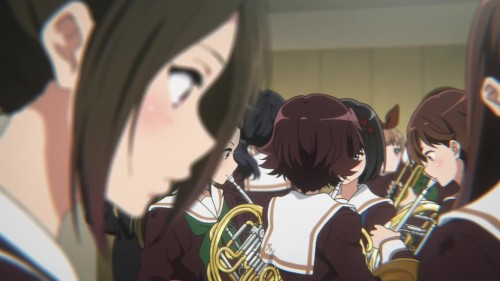
The final words from the conductor before you go on stage.
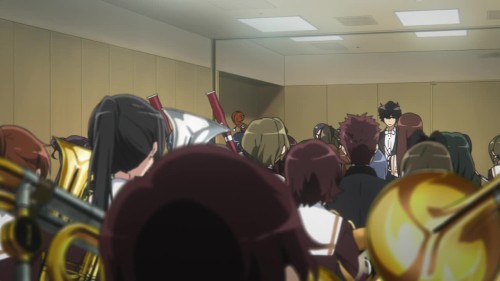
Lining up in nervous anticipation, hearing the muffled sounds of the group before yours.
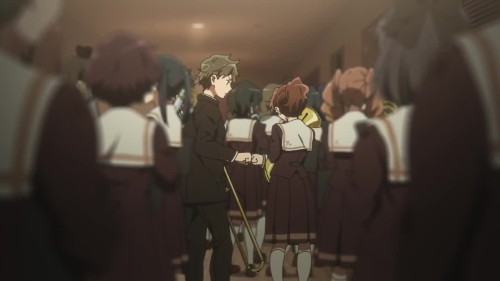
That first, secret glance at the audience, shrouded in darkness.
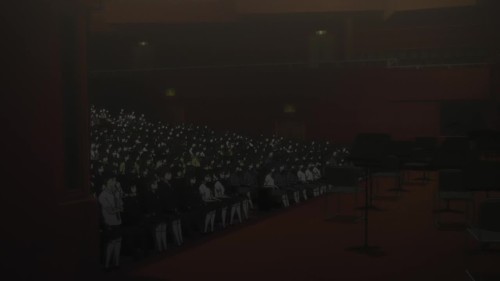
The secret looks between conductor and ensemble that no one else knows.
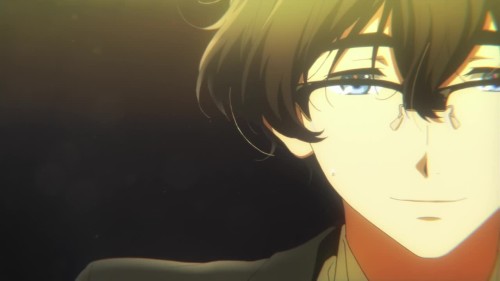
The tiny movements you’ve seen a hundred times from above your stand, made transcendental by the glow of the spotlights (there really is no glow like a spotlight).
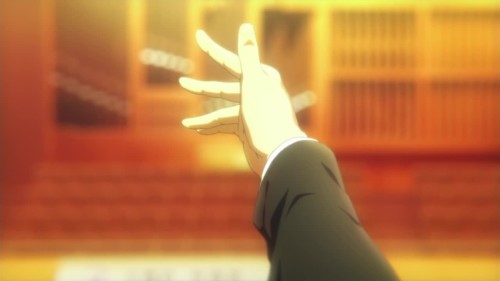
Pushing through the hardest part, you hope your hands don’t slip, you barely mastered this at tempo in practice and it’s a crap shoot as to whether it’ll happen or not on stage. You hope the trumpets don’t fuck up. You hope the clarinets don’t come in early. You count the bars nervously, you keep eye contact with the conductor (he’s always yelling at you not to look down at your music, but look up at him).
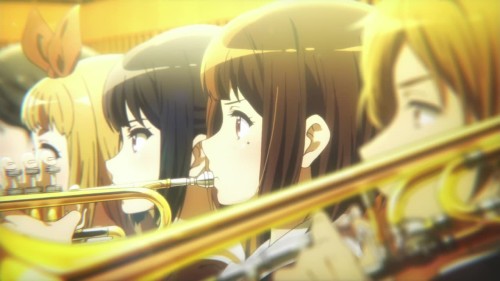
The soloist takes her stage, and you watch with bated breath, send her every good vibe you can. You know this isn’t her best performance, her notes sound a bit thin, but she’s more nervous than you can ever know.
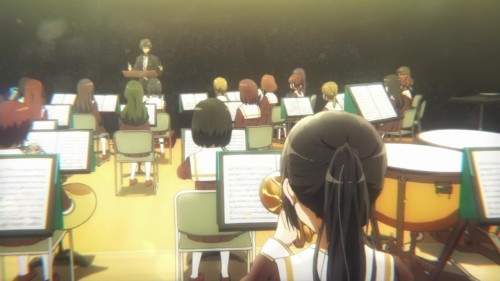
And finally suddenly it’s over, you know they’re clapping but you can’t hear it, your hands are slippery (when did they get that sweaty?), your armpits damp (I wasn’t sweating 5 minutes ago?), The spotlight is hurting your eyes. You follow the person in front of you and are enveloped by the dark of the backstage, where the stage hands smile at you and say congratulations, but you’re running on adrenaline, and just don’t hear a thing. When you come to you’re in the holding area, cleaning your instrument out. The boys are goofing off. The conductor comes in to try and debrief the performance, but it falls on deaf, giddy ears. You sneak back into the black of the audience to watch everyone else.
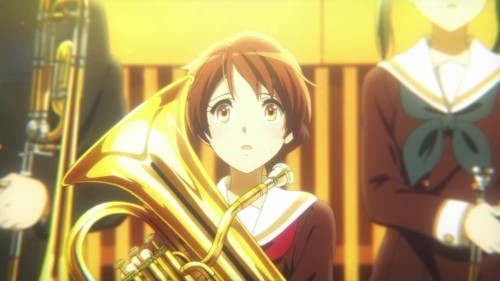
When I finished watching Euphonium, it was nearly midnight on a weekday. I was overcome. All I could think was, when was the last time I even looked at my flute? And so I crept to my apartment’s storage closet, careful not to drop any boxes and make a ruckus that would wake up my mom. I slid my flute out of its hiding place and put it together, hands falling on familiar keys.
I was content to take a picture and tweet about it for old time’s sake, but I apparently wasn’t the only one feeling this way after watching Euphonium. A few others on twitter picked up their old instruments too, and tweeted me about it. Shit, I thought. Now I have to practice. And so for about an hour a day, every day, I have.
At the risk of sounding like an old fart: kids these days have it so easy. My parents couldn’t afford a tuner or a metronome, but now you can just download smartphone apps for free. And in doing so, I realized: I haven’t ever faced the music properly. I played the notes, but I never thought about how I could make them sound better – I thought that the way I played them was the only way they could sound. I understood the rhythms, but never how they locked into the meter of the piece. And once I started practicing those things, I started getting better at a fairly quick clip. I’ve probably made more progress on the flute now than I did in all 6 years of band.
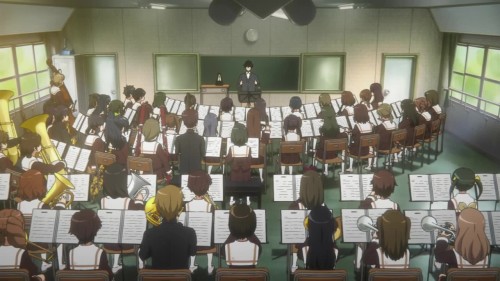
Euphonium’s Taki-sensei starts every session by saying: “let’s play some enjoyable music” – some tanoshii ongaku, if you will. What follows is a merciless breakdown of the band’s faults, cutting even our main character from a part because she fails to make his standards. The reality of making ‘enjoyable’ music is that huge chunks of the process aren’t enjoyable in the least. It’s sheer, punishing repetition, pushing the metronome forward 5 beats at a time to get to the tempo you need to be at, smoothing out every crescendo, and making it all sound effortless, all for a small sliver of glory.
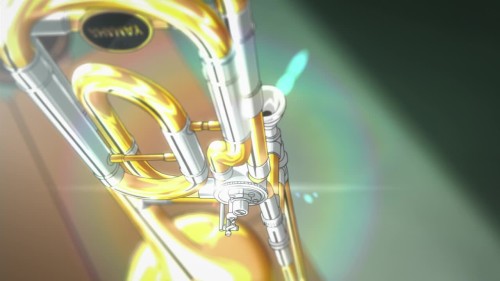
I told a friend the trumpet story as I coaxed her to lend me her music stand (another thing my parents couldn’t afford), to which she replied: “well, why not buy a trumpet then?” Why not, indeed? I’m an adult with my own income, free to make my own choices. But for better or worse, I’m starting to think I’m a flute to the core. My mood shifts with the wind, from sweet and cloying to fierce and dark. And as much as I aspire to the brave, noble, rich sound of the trumpet, I think my own instability lends itself towards the flute a bit more. I’ve never met an instrument I didn’t think was a magical, captivating object, and because of Sound! Euphonium, I’ve once again become captivated with my flute.

Leave a Reply